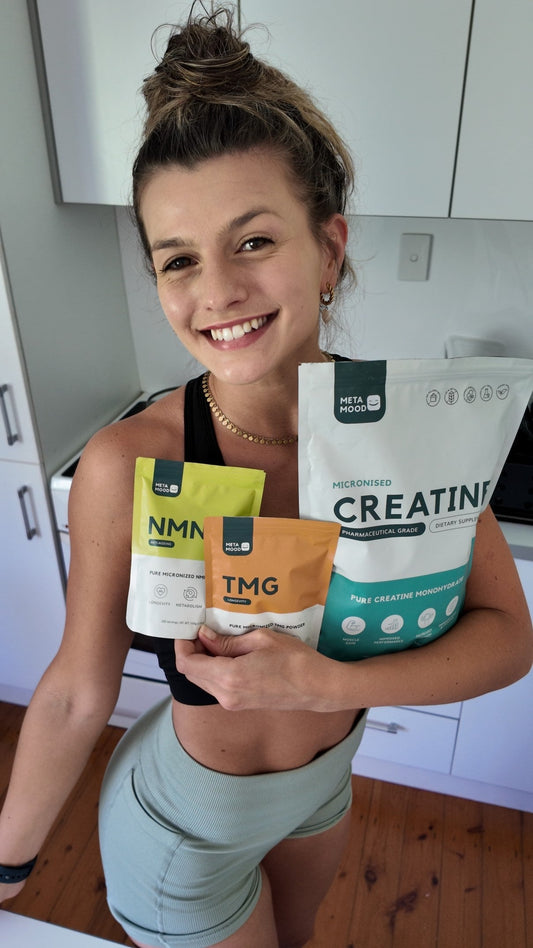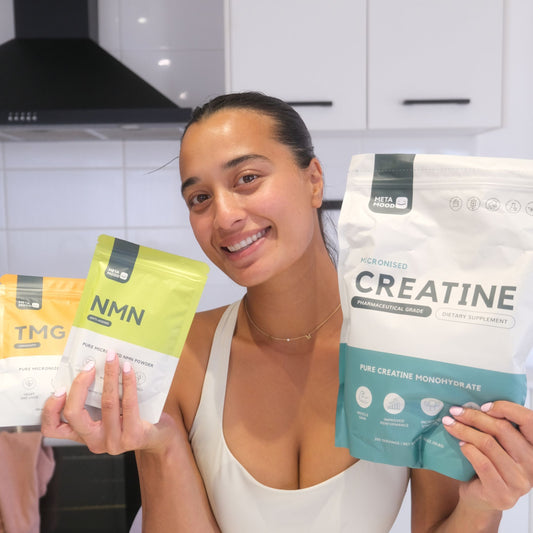Trimethylglycine (TMG), also known as betaine, is gaining attention for its health benefits, from supporting heart health and liver function to enhancing physical performance and cognitive wellness. While TMG supplementation is increasingly popular, understanding natural food sources and how to integrate them effectively into your diet can maximize your overall well-being.
What Is TMG and Why Does Your Body Need It?
TMG is a naturally occurring compound initially discovered in sugar beet juice. It serves two critical functions in the body:
-
Methylation: Acting as a methyl donor, TMG supports essential biological processes like detoxification, liver function, neurotransmitter synthesis, DNA synthesis, and homocysteine metabolism. Elevated homocysteine levels are linked to heart disease and cognitive decline, making methylation crucial for maintaining overall health (PMC).
-
Cellular Osmoregulation: TMG helps cells, especially those in the liver and kidneys, maintain proper hydration and structural integrity under stress, safeguarding organ functionality (PMC).
How to Get TMG Naturally: Top Natural Sources of TMG
1. Wheat Germ and Wheat Bran
Wheat germ and wheat bran are exceptionally rich in TMG, containing approximately 1241 to 1339 mg per 100g. While these components are nutritionally potent, modern diets often exclude them through refining processes, limiting everyday consumption.
2. Spinach
Spinach delivers substantial TMG, about 600–645 mg per 100g. This versatile leafy green can be consumed raw or lightly steamed to retain its nutrient content. Boiling significantly reduces TMG content, and this nutrient loss can occur in other TMG-rich foods as well, so minimal cooking methods are preferred across the board.
3. Beets
Beets provide around 114–297 mg of TMG per 100g. Beyond their TMG content, they offer nitrates beneficial for cardiovascular health and athletic performance. Fresh beet juice or grated raw beets in salads are effective ways to maintain their nutritional profile.
4. Seafood (Shrimp and Mussels)
Seafood, particularly shrimp and mussels, contains moderate TMG levels (approximately 219 mg per 100g). Regular consumption offers additional benefits, such as omega-3 fatty acids and selenium, supporting heart and cognitive health.
5. Whole Grains
Whole-grain products, including breads and crackers, can provide around 200 mg of TMG per 100g. Opting for whole-grain options over refined grains helps enhance TMG intake while offering digestive benefits from increased dietary fiber.
6. Quinoa
Quinoa provides approximately 390–630 mg of TMG per 100g and is an excellent gluten-free option. Like other plant sources, boiling can lower its TMG content, so steaming or sprouting is preferable.
Maximizing TMG Intake Through Diet
To boost dietary TMG:
-
Incorporate raw spinach into smoothies or salads.
-
Choose whole-grain cereals or breads containing wheat germ and bran.
-
Consume seafood regularly, emphasizing shrimp and mussels.
-
Opt for fresh beet juice or raw beet dishes.
-
Include quinoa-based meals such as salads or breakfast bowls.
Modern diets are often low in TMG because refined grain products (white bread, pasta) lack bran and germ, and because spinach, beets, and quinoa are not consistently consumed in large quantities — or are often cooked in ways that reduce their TMG content.
How Much TMG Do You Actually Need?
A typical Western diet provides approximately 0.5 to 2.5 grams of TMG daily. Achieving the upper end of this range usually requires deliberate dietary choices—such as including bran cereals, spinach salads, and seafood regularly. However, cooking methods and processing significantly affect TMG content, highlighting the difficulty in consistently obtaining adequate amounts through diet alone.

Why Consider TMG Supplementation?
Realistically, maintaining high dietary TMG intake can be challenging. Supplementation provides a reliable, convenient alternative to ensure sufficient methylation support, especially beneficial for:
-
Individuals with genetic methylation challenges (e.g., MTHFR mutations).
-
Athletes seeking improved hydration and performance. Some studies show benefits such as reduced fatigue, greater protein synthesis, and increased creatine production, though results are mixed and not all research finds a performance boost.
-
People managing liver health or elevated homocysteine. TMG can lower homocysteine by converting it into methionine, potentially supporting heart health, though some studies have noted a slight rise in LDL cholesterol in certain individuals.
-
Those looking to improve insulin sensitivity and fat metabolism, as several human and animal studies have linked higher TMG intake to better blood sugar regulation and metabolic health.
-
Those supplementing with NAD+ boosters like NMN, which increase methylation demand and can deplete methyl donors like TMG. Without replenishment, this may lead to fatigue, mood changes, and reduced NMN benefits.
-
Individuals using certain antidepressants, particularly S-adenosyl-methionine (SAMe), as TMG may enhance their effects and also directly improve depression or anxiety symptoms linked to high homocysteine.
Supplementation ensures consistent intake unaffected by dietary variables and cooking losses.
While dietary sources offer meaningful ways to enhance TMG intake, practical supplementation may be beneficial to ensure consistent, optimal levels, particularly for those under increased metabolic demands. Balancing dietary efforts with strategic supplementation can significantly support heart health, cognitive function, liver efficiency, and physical performance.
Potential Side Effects
TMG is generally well-tolerated, but higher doses may cause mild digestive discomfort such as diarrhea, bloating, cramps, or nausea. Rarely, excessive methionine from high intake can lead to increased brain fluid levels, so dosing should be approached cautiously.
Frequently Asked Questions
How to get TMG naturally?
You can get TMG naturally by eating a diet rich in whole, unprocessed foods such as wheat bran, wheat germ, spinach, quinoa, beets, and certain seafood like shrimp and mussels. Minimizing food processing and avoiding overcooking helps preserve TMG content.
What foods provide TMG?
Foods highest in TMG include wheat bran (~1339 mg/100g), wheat germ (~1241 mg/100g), spinach (~577–645 mg/100g), quinoa (~390–630 mg/100g), shrimp (~219 mg/100g), and beets (~114–297 mg/100g). Whole grains and other plant-based sources also contribute smaller amounts.
Where is TMG found naturally?
TMG is found naturally in plant and animal foods, especially in cereal grains, leafy greens, root vegetables, and shellfish. It’s also present in smaller amounts in many other foods, making a varied diet helpful for meeting daily needs.
Does TMG raise blood pressure?
Current evidence does not indicate that TMG directly raises blood pressure in healthy people. However, it may slightly increase LDL cholesterol in some individuals, so those with cardiovascular concerns should monitor both cholesterol and blood pressure when supplementing.
References
- Craig, S. A. (2004). Betaine in human nutrition. American Journal of Clinical Nutrition, 80(3), 539-549. PMC
- Kathirvel, E., et al. (2013). Betaine attenuates hepatic triglyceride accumulation and liver injury. PLoS One, 8(12), e80815. PMC
- Hoffman, J. R., et al. (2009). Effect of betaine supplementation on power performance and fatigue. Journal of the International Society of Sports Nutrition, 6(1), 7. PMC
- Lever, M., & Slow, S. (2017). The clinical significance of betaine in depression and anxiety disorders. Nutrients, 9(4), 377. PMC




